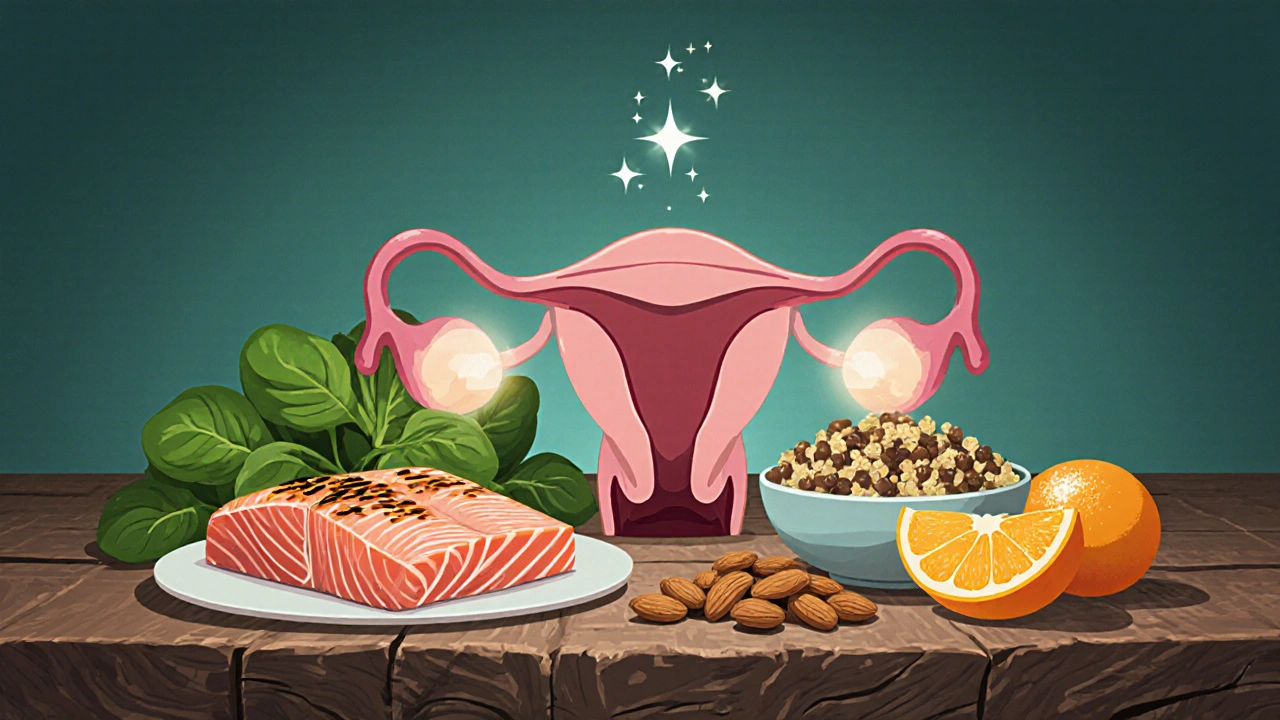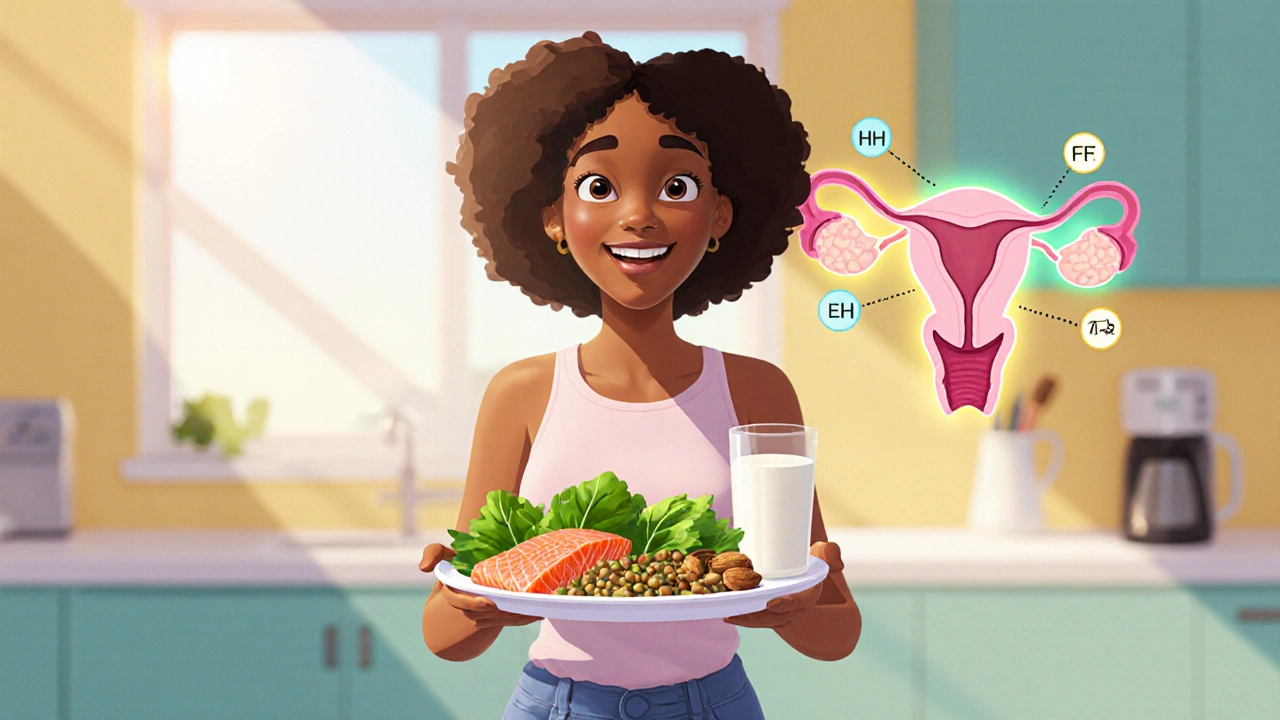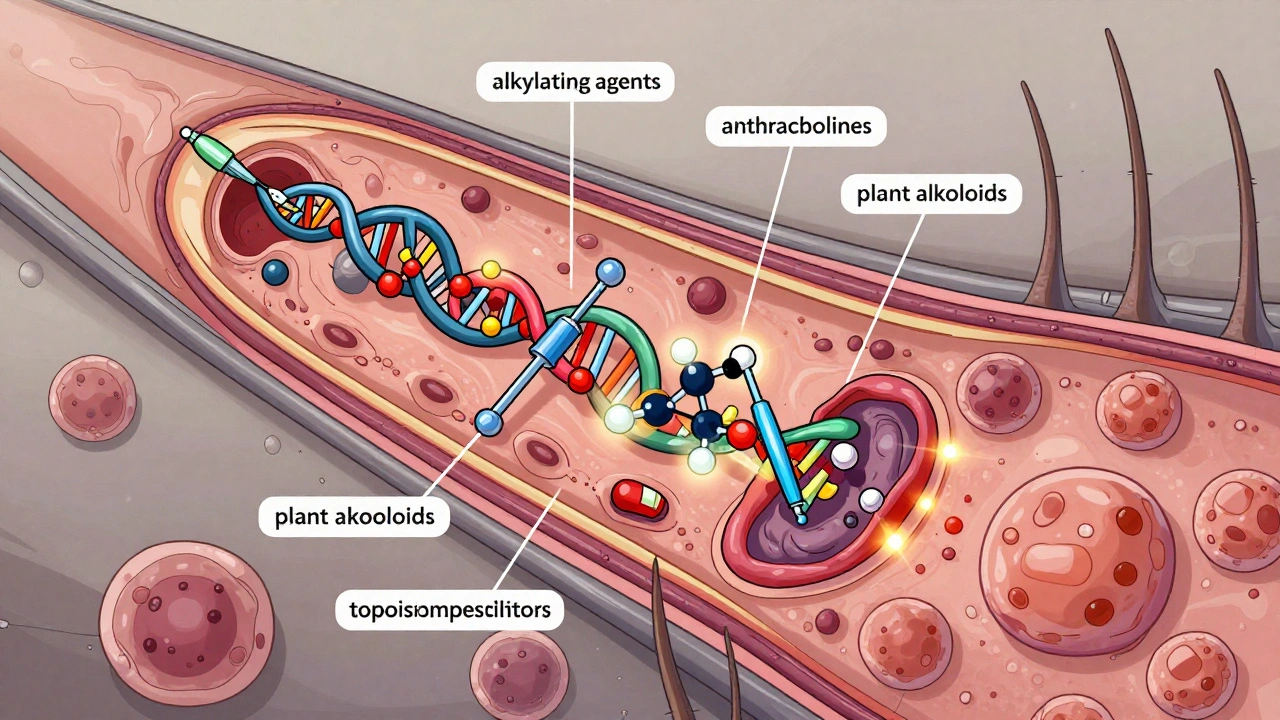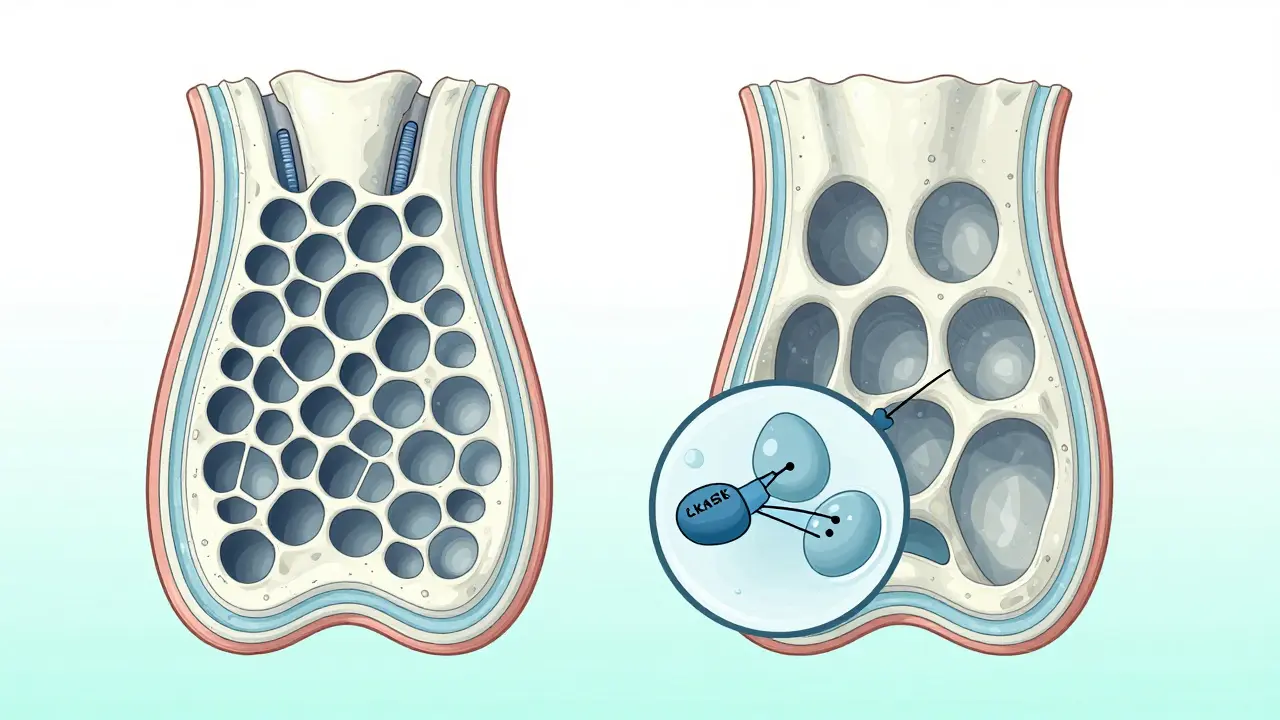Fertility Nutrient Calculator
Optimize Your Fertility Nutrition
Enter your daily intake of key fertility nutrients to see if you're meeting targets. Based on clinical recommendations for healthy ovulation and egg quality.
Folate
Critical for egg health400-800 µg daily
Vitamin D
Supports hormone balance800-2000 IU daily
Omega-3s
Reduces inflammation1-2 g EPA/DHA daily
Iron
Supports ovulatory energy18 mg daily
Zinc
Boosts hormone secretion8 mg daily
Ever wondered why changing what you eat sometimes seems to shift your cycle? The link between diet and reproductive timing is real, and understanding it can turn confusing symptoms into clear actions.
Key Takeaways
- Balanced macronutrients keep hormone spikes in check, supporting regular ovulation.
- Micronutrients like folate, vitamin D, and omega‑3s boost egg quality and hormone synthesis.
- Low‑glycemic foods stabilize insulin, reducing ovulatory disruptions caused by PCOS.
- Too little or too much body fat can impair estrogen production, harming fertility.
- Simple meal tweaks-adding leafy greens, fatty fish, and iron‑rich proteins-can improve chances of conception.
Understanding Ovulation
When we talk about Ovulation is the monthly release of a mature egg from the ovary, triggered by a cascade of hormones, diet plays a surprisingly big role. The process hinges on the precise timing of luteinizing hormone (LH) and follicle‑stimulating hormone (FSH), both of which are sensitive to blood‑sugar swings and nutrient status.
Women with irregular cycles often have underlying metabolic stress. Even subtle insulin spikes can suppress LH, delaying or skipping the egg‑release window.
How Nutrition Influences Hormones
Nutrition fuels the endocrine system in three ways: providing building blocks for hormone synthesis, regulating insulin, and modulating inflammation.
Hormones are chemical messengers that travel through the bloodstream to coordinate bodily functions. For ovulation, estrogen, progesterone, LH, and FSH dominate the conversation. Those hormones rely on cholesterol, fatty acids, and specific vitamins to be produced efficiently.
When Insulin spikes after high‑glycemic meals, it can lower sex‑hormone‑binding globulin (SHBG), leading to excess free testosterone-a key factor in polycystic ovary syndrome (PCOS). Managing insulin through low‑glycemic carbs helps restore hormonal balance.

Top Nutrients for Healthy Ovulation
Research consistently points to a handful of nutrients that directly affect egg release and quality.
| Nutrient | Primary Effect | Recommended Daily Intake |
|---|---|---|
| Folate B‑vitamin important for DNA synthesis | Supports egg maturation, reduces neural‑tube defects | 400‑800µg |
| Vitamin D fat‑soluble vitamin that modulates immune and endocrine function | Improves ovarian follicle development, balances estrogen | 800‑2000IU |
| Omega‑3 fatty acids essential polyunsaturated fats found in fish oil and flaxseed | Reduces inflammation, enhances blood flow to ovaries | 1‑2g EPA/DHA |
| Iron mineral needed for oxygen transport and cellular energy | Prevents anemia, supports ovulatory energy demand | 18mg (women 19‑50) |
| Zinc trace element important for hormone synthesis | Boosts LH and FSH secretion | 8mg |
Foods to Embrace
- Leafy greens (spinach, kale) - packed with folate and iron.
- Fatty fish (salmon, sardines) - prime source of omega‑3s and vitamin D.
- Legumes (lentils, chickpeas) - low‑glycemic carbs plus zinc.
- Full‑fat dairy or fortified plant milks - provide vitamin D and healthy fats.
- Nuts and seeds (walnuts, chia) - deliver omega‑3s and magnesium for smoother cycles.

Foods to Limit
- Refined sugars and pastries - cause rapid insulin spikes.
- Excessive caffeine (over 300mg/day) - may disrupt estrogen balance.
- Highly processed meats - often high in sodium and saturated fat.
- Trans‑fat laden snacks - increase systemic inflammation.
Sample Day of Fertility‑Friendly Meals
- Breakfast: Spinach‑feta omelet with a side of sliced avocado. (Provides folate, iron, healthy fats.)
- Mid‑morning snack: Greek yogurt with blueberries and a sprinkle of chia seeds. (Vitamin D, omega‑3s.)
- Lunch: Quinoa salad with roasted salmon, mixed greens, cherry tomatoes, and olive‑oil dressing. (Omega‑3s, zinc, low GI.)
- Afternoon snack: A handful of almonds and an orange. (Vitamin E, folate.)
- Dinner: Lentil stew with carrots, kale, and a side of sweet potato. (Iron, fiber, low glycemic load.)
Sticking to balanced macronutrients throughout the day keeps blood‑sugar steady, letting your endocrine system focus on the ovulatory hormone cascade.

Common Pitfalls & How to Fix Them
- Skipping meals: Leads to cortisol spikes, which can suppress LH. Aim for 3‑4 small meals every 4-5 hours.
- Relying on “diet” pills: Many contain stimulants that interfere with hormone receptors. Choose whole foods instead.
- Ignoring iron status: Even mild anemia can blunt ovulatory signals. Test ferritin annually if you have heavy periods.
- Over‑exercising: Excessive cardio drops body fat below 18%, lowering estrogen. Include strength training and rest days.
Frequently Asked Questions
Frequently Asked Questions
Can a specific diet guarantee pregnancy?
No single diet guarantees conception, but a nutrient‑dense plan improves egg quality and hormonal balance, increasing the odds of a successful pregnancy.
How long should I follow a fertility‑focused diet before expecting results?
Most clinicians recommend at least three menstrual cycles (about three months) to see measurable changes in cycle regularity and hormone profiles.
Is it okay to take a prenatal vitamin before trying to conceive?
Yes. Prenatal vitamins supply folate, iodine, and vitamin D-nutrients directly linked to healthy ovulation and early embryonic development.
Does caffeine really affect fertility?
Moderate caffeine (up to 200mg per day, roughly one cup of coffee) is generally safe. Higher amounts can increase cortisol and slightly lower estrogen levels.
What role does body weight play in ovulation?
Both underweight (<18BMI) and overweight (>30BMI) can disrupt estrogen production and impair LH surge, leading to irregular or absent ovulation.
By aligning your plate with the hormone‑friendly nutrients above, you give your body the best chance to release a healthy egg each month. Remember, consistency trumps occasional “super‑food” binges-steady, balanced meals are the real fertility fuel.








15 Comments